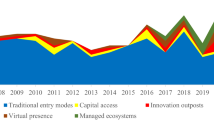Abstract
This special issue of the Journal of Knowledge Economy is to focus on a number of particular aspects related to the process of knowledge creation, dissemination and its use. This follows largely the ideas developed within the European Union 6th Framework project ‘Understanding the Relationship between Knowledge and Competitiveness in the Enlarging European Union’, better known as the U-Know project. The main goal of the U-Know project was to enhance the understanding of knowledge and its role for economic competitiveness and wider societal development in support of the Lisbon agenda for an enlarging Europe. It focuses on the interaction between enterprises with the higher education and the government sectors in environments characterised by the spread of knowledge. This interaction is governed by factors such as institutional arrangements, organisational conditions, norms and values, attitudes and cognitive flexibility that align the agents into a system of networks. Specific forms of interaction shape different characteristics of knowledge, each of which has its own repercussion on the process of knowledge creation, its dissemination and its use.
Similar content being viewed by others
References
Arrow, K. (1962). Economic welfare and the allocation of resources for invention. In R. R. Nelson (Ed.), The rate and direction of inventive activity: economic and social factors. Princeton and Oxford: Princeton University Press.
European Commission (2005). Communication from the Commission: building the ERA of knowledge for growth. Brussels: COM. 118 final.
David, P. A., & Foray, D. (2002). An introduction to the economy of the knowledge society. International Social Science Journal, 54(171), 9–23.
Foray, D. (2004). The economics of knowledge. Cambridge, MA and London: MIT Press.
Lundvall, B.-A., & Johnson, B. (1995). The learning economy. Journal of Industry Studies, 1(2), 23–42.
Mokyr, J. (2002). The gifts of Athena: historical origins of the knowledge economy. Princeton and Oxford: Princeton University Press.
Penrose, E. (1959). The theory of the growth of the firm. Oxford: Oxford University Press.
Polanyi, M. (1966). The tacit dimension. Chicago: University of Chicago Press.
Ryle, G. (1949/2009). The concept of mind. New York: Routledge.
Reiter, S. (2001). Knowledge, discovery and growth. In G. M. Olson, T. W. Malone, & J. B. Smith (Eds.), Coordination theory and collaboration technology (pp. 193–206). Mahwah, NJ: Lawrence Erlbaum Associates.
Rosenberg, N. (1982). Inside the black box: technology and economics. Cambridge, UK: Cambridge University Press.
Author information
Authors and Affiliations
Corresponding author
Rights and permissions
About this article
Cite this article
Knell, M., Stephan, J. Introduction to the Special Issue. J Knowl Econ 12, 139–145 (2021). https://doi.org/10.1007/s13132-015-0315-y
Received:
Accepted:
Published:
Issue Date:
DOI: https://doi.org/10.1007/s13132-015-0315-y




